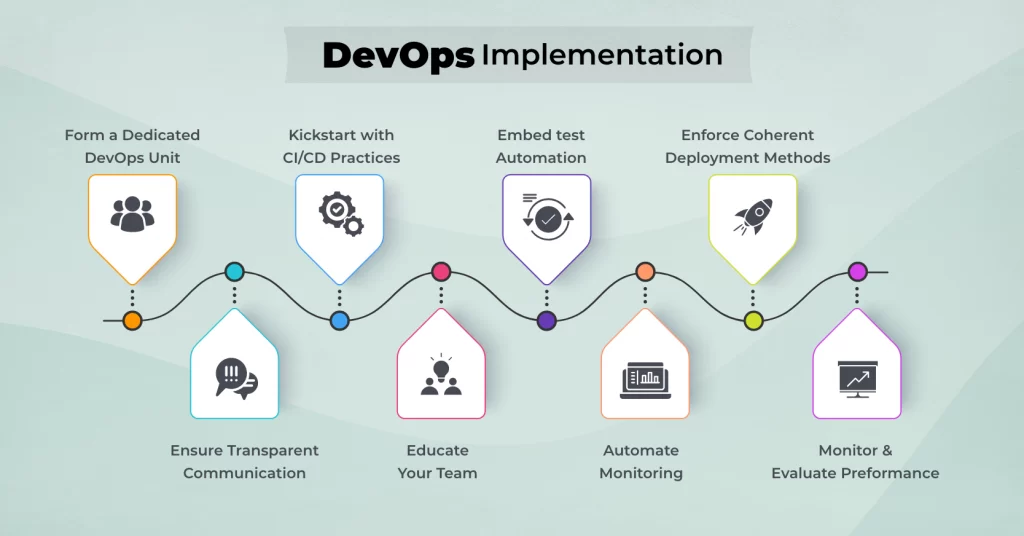As the buzz around DevOps implementation continues to echo through the corridors of businesses and enterprises, the precise contours of this concept often seem to blur. Is DevOps a culture, a movement, or perhaps a fusion of all these elements? Does its definition vary or not?
Regardless of how you define DevOps, achieving success in this domain is hardly a one shot feat; it’s more of an invigorating journey. Today’s organizations across various niches are fixated on taking their information technology software delivery to unprecedented heights.
When executed with great delicacy, DevOps emerges as a cornerstone in realizing this aspiration. Yet, though the roots of DevOps dig back over the years, numerous enterprises are yet to sow its seeds within their processes. And a subset continues to grapple with the challenge of harnessing DevOps to its full potential.
Table of Contents
Discovering DevOps Success – Your Path To Achievement
So, what actually distinguishes thriving DevOps implementations? The answer rests in the simplicity of the strategies employed to craft a triumphant DevOps implementation blueprint. However, it is not just about knowing the strategies alone; it’s all about understanding how to put everything into action effectively.
In this article’s pages, we will paint a clear picture of what DevOps truly entails. Subsequently, we will unfurl the reasons that underscore the imperative nature of DevOps adoption within the organizational ecosystem.
Lastly, we will go through the steps that pave the path to a successful DevOps implementation plan, ensuring that your voyage is marked by success at every juncture. Let’s begin!
What Is DevOps And Why Does It Matter?
DevOps isn’t just a fancy word – it’s a powerful way of making things work smoothly in the world of technology. Imagine you are baking cookies with your friends. One person mixes the ingredients, another puts the cookies in the oven, and someone else watches to make sure they don’t burn. DevOps is a bit like that for making software instead of cookies.
In simple terms, DevOps is like teamwork for computers. The people who create new software (the developers) and the people who make sure it runs well and stays safe (the operations folks) work together closely, like a team of superheroes.
But Wait, why does this teamwork matter? Well, think about building a treehouse. If one friend builds the ladder and another puts up the walls, the treehouse will come together much faster, right? DevOps makes software development faster, just like building a treehouse together.
Bringing Harmony To Tech – The Essence Of DevOps Collaboration
But that’s not all. DevOps also helps to catch problems early, like finding a wobbly ladder before it makes the treehouse unsafe. When developers and operations work together from the start, they can find and fix issues before they become big problems, which makes everyone happy – especially the users of the software!
So, we can conclude here that DevOps is like the secret ingredient that makes software development teams work better together and create awesome things faster. In other words, it’s all about teamwork, speed, and making sure the final result is top-notch.
DevOps Benefits For Business
In the dynamic world of technology, where changes happen quickly, businesses are constantly seeking methods to stay ahead of the curve. This is where DevOps implementation steps in as a transformative force that offers a plethora of advantages, propelling businesses toward success. Let’s see the benefits of DevOps implementation in this section.
1. Increased Collaboration
In general, collaboration holds the key to success. A harmonious rhythm emerges when developers and operations teams unite their strengths from the beginning. Just like different instruments in a band, their combined efforts create a symphony of efficiency. This seamless teamwork clarifies communication, reduces misunderstandings, and accelerates progress.
2. Better Performance
DevOps optimize software development, akin to tuning a high-performance car. Developers and operations experts collaborate closely, fine-tuning each aspect. This meticulous alignment leads to software that not only runs well but does so efficiently. With resources maximized and processes optimized, the software’s performance soars, giving your business a competitive edge.
3. Quality Client Experience
No doubt, delivering flawless software is a top priority. By detecting and rectifying issues before they surface, DevOps ensures a seamless experience for users. This dedication to quality translates to satisfied clients who receive software that meets their expectations and needs.
4. Cutting Out On Expenses
Efficiency is the hallmark of DevOps. By eliminating inefficiencies and streamlining processes, DevOps reduces unnecessary costs. Close collaboration between development and operations minimizes waste, errors are reduced, and workflows become more seamless. This streamlined approach translates to cost-effective software development.
5. Quicker Deployment
DevOps turns software development into a swift and more efficient process. By implementing automation and structured processes, DevOps expedites deployment. This agility enables your business to launch a number of new features and updates promptly, keeping in line with the dynamic tech landscape.
6. Reduced Implementation Failure
Building a solid foundation is essential for success, whether constructing a sandcastle or developing software. DevOps lays this groundwork by identifying and resolving issues early in the process. This proactive approach minimizes the risk of implementation failures, ensuring that your software operates smoothly and effectively.
Crafting a Successful DevOps Implementation Plan
To truly unlock these benefits, a well-thought-out DevOps implementation plan is crucial. Here’s how you can set yourself up for success:
Assessment and Planning: Understand your current processes and identify areas for improvement. Plan how DevOps can fit into your workflow and bring immense value.
Clear Communication: Ensure that developers and operations teams communicate openly and share their insights. Collaboration is at the heart of DevOps’ success in the longer run.
Automation: Automate repetitive tasks like testing and deployment. Automation reduces errors, speeds up processes, and boosts efficiency to a much larger extent.
Continuous Integration and Deployment: Implement CI/CD pipelines to ensure that new code is regularly tested and deployed. This keeps the development cycle agile and responsive.
Monitoring and Feedback: Set up systems to monitor software performance after deployment. Collect feedback from users and make improvements based on real-world usage.
Learning and Adaptation: Create a culture of learning and improvement. Encourage teams to learn from mistakes and make changes for the better.
Overall, we can say that making the most out of DevOps implementation is not just about following a trend; it’s a strategic move that can revolutionize your business’s software delivery process. The benefits span from enhanced collaboration to quicker deployment, ensuring your software meets user needs and business goals.
– By crafting a solid DevOps implementation plan, you are setting your business on a path to success in today’s competitive tech landscape. We strongly feel you will agree with us.
How to Implement DevOps in an Organization?
In the journey of achieving successful DevOps implementation, a well-crafted strategy paves the way for seamless operations. Let’s dive into the key steps that shape a robust DevOps implementation plan, ensuring efficient software delivery and improved collaboration.

1. Form A Dedicated DevOps Operations Unit
At the outset of your DevOps implementation journey, creating a dedicated team exclusively focused on DevOps operations is a pivotal step. This team is the driving force behind integrating all the DevOps practices within your existing workflows.
By assembling a team comprising both development and operations experts, you ensure a holistic approach to implementation. Their combined expertise brings diverse skills to the table, creating innovative solutions and comprehensive problem-solving.
2. Kickstart With CI/CD Practices
A cornerstone of successful DevOps implementation is the adoption of Continuous Integration and Continuous Deployment (CI/CD) pipelines. This transformative approach ensures that the new code is automatically subjected to rigorous testing and seamlessly deployed to various environments.
Automating these processes eliminates potential bottlenecks and significantly expedites the development lifecycle. This, in turn, leads to quicker iterations, allowing your team to respond to user feedback and market demands rapidly. The result is a dynamic software development cycle that is responsive, efficient, and adaptable.
3. Embed Test Automation
Automation is central to the DevOps philosophy, a principle that extends to testing. By implementing test automation, you can dramatically enhance your software’s quality and reliability. Automated tests swiftly identify bugs and inconsistencies, enabling developers to rectify issues early in development.
This reduces manual effort and ensures that your software is robust and dependable, effectively meeting user expectations. The incorporation of automated testing guarantees thorough and consistent assessment, leading to heightened confidence in the software’s functionality.
4. Enforce Coherent Deployment Methods
DevOps underscores the importance of consistent deployment practices. Implementing standardized deployment processes ensures that your software is rolled out uniformly across different environments. This coherence minimizes the chances of deployment-related errors, enhancing reliability and easing troubleshooting efforts.
Above all, coherent deployment practices promote better collaboration between development and operations teams, creating a shared sense of responsibility for the software’s performance and stability. The result is a smoother transition from development to production environments, reducing potential unforeseen challenges during deployment.
Recommended Reading
5. Ensure Transparent Communication Across Teams
Effective communication is the lifeblood of successful DevOps implementation. Encourage transparency by maintaining open channels of communication between development, operations, and other relevant teams. This synergy ensures that everyone remains on the same page, aligns their objectives, and collectively works towards the common goal of efficient software delivery.
Regular updates, meetings, and collaborative tools can aid in creating a culture of shared responsibility and accountability. By nurturing open lines of communication, your teams can promptly address challenges, exchange insights, and collaboratively implement processes.
6. Exercise Patience And Educate Your Team
Embracing DevOps is akin to starting on a journey of transformation. Cultivate patience within your teams, emphasizing that the process takes time. Provide comprehensive training to equip team members with all the necessary skills and knowledge to navigate this new landscape.
Emphasize the importance of learning from mistakes and iterating on processes to refine your DevOps implementation plan continually. Nevertheless, we can say that creating an environment that values patience and continuous improvement encourages adaptive thinking and empowers your teams to tackle challenges with resilience.
7. Automate Monitoring Dashboards
To effectively monitor and manage your DevOps processes, automate the creation of monitoring and reporting dashboards. These dashboards provide real-time insights into the performance of your software, enabling quick identification and resolution of issues.
Automation ensures that your teams are equipped with up-to-date information, empowering them to make informed decisions promptly. In fact, automated dashboards enhance visibility and streamline decision-making, enabling proactive responses to emerging concerns.
8. Monitor And Evaluate Performance
Continuously assessing the efficacy of your DevOps implementation plan is vital to its success. Regularly monitor key performance indicators (KPIs) that measure improvements in efficiency, quality, collaboration, and other relevant metrics.
These insights allow you to gauge the impact of your efforts, identify areas for further enhancement, and ensure that your DevOps practices remain aligned with your organizational goals. The practice of tracking performance facilitates evidence-based decision-making, enabling continuous adjustments to optimize the implementation strategy.
Note: By diligently following the above step-by-step guide, your organization can successfully navigate the intricate DevOps implementation path. The resulting benefits encompass streamlined operations, enhanced software delivery, and much more.
Wrapping Up
There is no doubt that DevOps has become a strategic imperative in today’s environment. As businesses strive for efficient software delivery, improved collaboration, and enhanced user experiences, DevOps emerges as a guiding light.
And when your business requires DevOps engineers, CONTUS is the answer. With a comprehensive DevOps consulting service, CONTUS enables your applications to be delivered faster through expert implementation of DevOps methodologies.
From cloud-native adoption to AIOps integration and security-first practices to GitOps implementation, CONTUS equips you to harness the power of DevOps, ensuring a competitive edge in the ever-evolving tech landscape.








Hi, I’ve found that a gradual transition to DevOps has worked wonders for our team. Starting with smaller projects allowed us to refine our strategy before full implementation.
Hi, I’m curious about the tools mentioned in this article. Choosing the right tools can greatly impact the success of a DevOps strategy.
This article provides a comprehensive guide on DevOps implementation. The step-by-step approach makes it seem less daunting to get started.